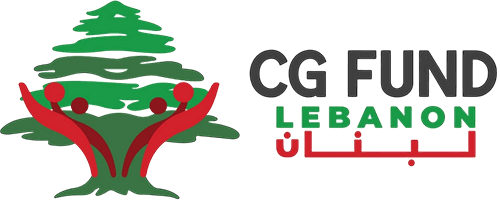Saida Summer Camps 2025 Kuwaitiya and Omaniah School
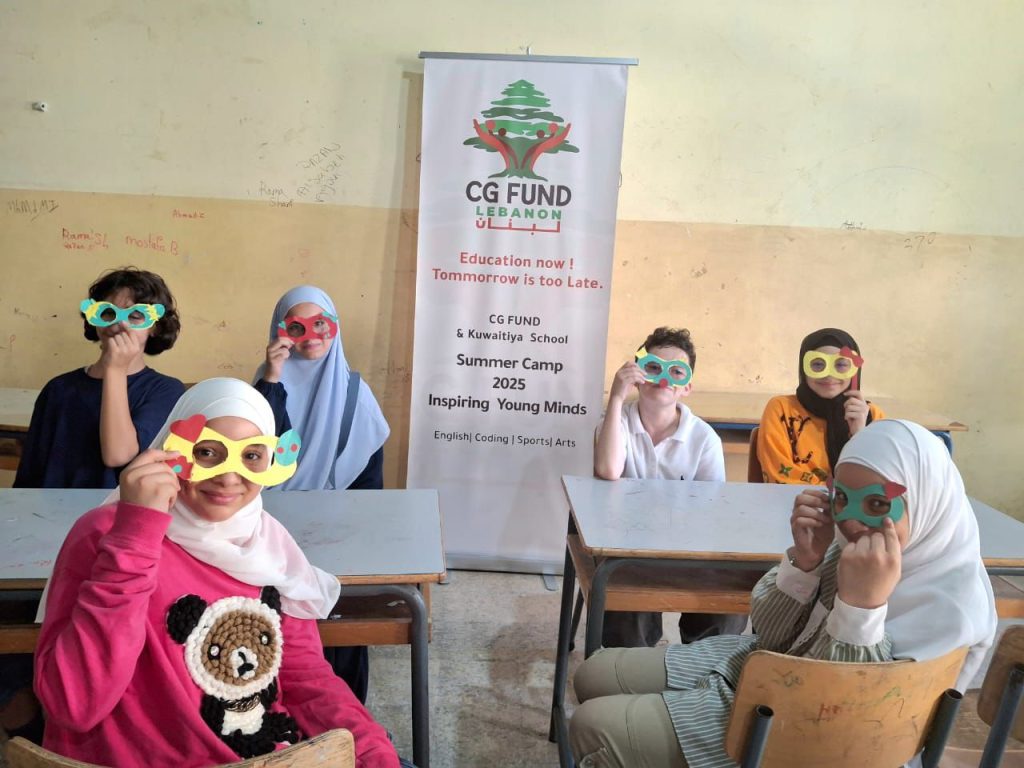
Empowering Students through Summer Camps: A Summer of Growth and Discovery This summer, CG Fund Funded the 2 Summer Camps in Saida that gave young students the chance to learn, grow and connect. At Kuwaitiya School, 60 students spent four enriching weeks of learning, creativity, and growth, while at Omaniah school, 75 students enjoyed a Five-week camp filled with discovery and creativity. The camp was designed not only as a place for education, but also as a space where young minds could connect, build friendships, and develop life skills. Every week, students engage in diverse sessions that enrich their skills, preparing them for both academic and personal success. From exploring the digital world to building communication skills, the camp gave each participant the chance to discover something new while enjoying a supportive and fun environment. Highlights from the Camp: Coding Coding was one of the highlights of the program, giving students hands-on experience with the basics of programming and problem-solving. Through interactive workshops, they learned how to think logically, design simple projects, and see technology as a tool for creativity and innovation. Netiquette Equally important was netiquette, where students explored the values of respectful and safe online behavior. In today’s digital age, this knowledge is vital. The sessions helped them understand how to communicate responsibly, protect their privacy, and use the internet in a positive way that reflects their character. English Classes The camp also strengthened English language skills through fun and practical lessons. Students practiced speaking, reading, and writing in ways that boosted both their confidence and fluency. These sessions supported their academic growth while opening doors to future opportunities. SEL Activities To balance learning with fun, the camp included a variety of activities that encouraged teamwork, creativity, and play. Whether it was group games, arts and crafts, or interactive challenges, these moments allowed students to relax, bond, and build friendships that will last beyond the summer camp. Basic Computer Literacy To strengthen their digital skills, students practiced essential computer skills. From using software confidently to managing files and navigating online platforms. These lessons gave them practical knowledge they can carry into school and future job opportunities.
Dar Al Mouaalmine Saida AND CRDP (Centre de Recherche et de Developpement Pedagogiques) to train 25 teachers in Scratch

CG Fund provided solar power, the networking infrastructure and the training. A five-week TIKANA – SCRATCH TRAINING course was conducted from February 2025 at the Teacher Training College in Saida. 25 teachers from 20 schools worked with two main trainers who delivered the course while four other trainers were responsible to follow up with the teachers. Each week the teachers followed a self-paced module asynchronously on their pace to discover the content, solve the activities, and learn scratch features and do practice exercises. It included an online weekly meeting with the teachers (synchronously) to follow up and answer all questions raised. Implementation was postponed due to the current situation in Lebanon. These newly trained teachers will introduce Scratch to the students at the start of the 2025-2026 academic year. Schools: • Solar power and 20 computers for Kuwaitiya Public Intermediate School • Solar power and 10 computers for Ain El Helweh Public Elementary School • 20 computers for Islah 1 Public Intermediate School • Solar power for Marwanieh Public Secondary School • Solar power and 10 computers for Mieh w Mieh Public Intermediate School • Solar power and 10 computers for Mostapha El Zaatari Public Secondary School • 25 computers for Thuraya Fares Public Secondary School • Solar power and 20 computers for Anjelik Saliba Public Intermediate School • 16 computers for Maarouf Saad Public Intermediate School • Saida Mixed Primary Public Intermediate School • Dr Hikmat Al Sabakh Public Secondary School
CODE BRAVE to train 16 teachers in coding and robotics
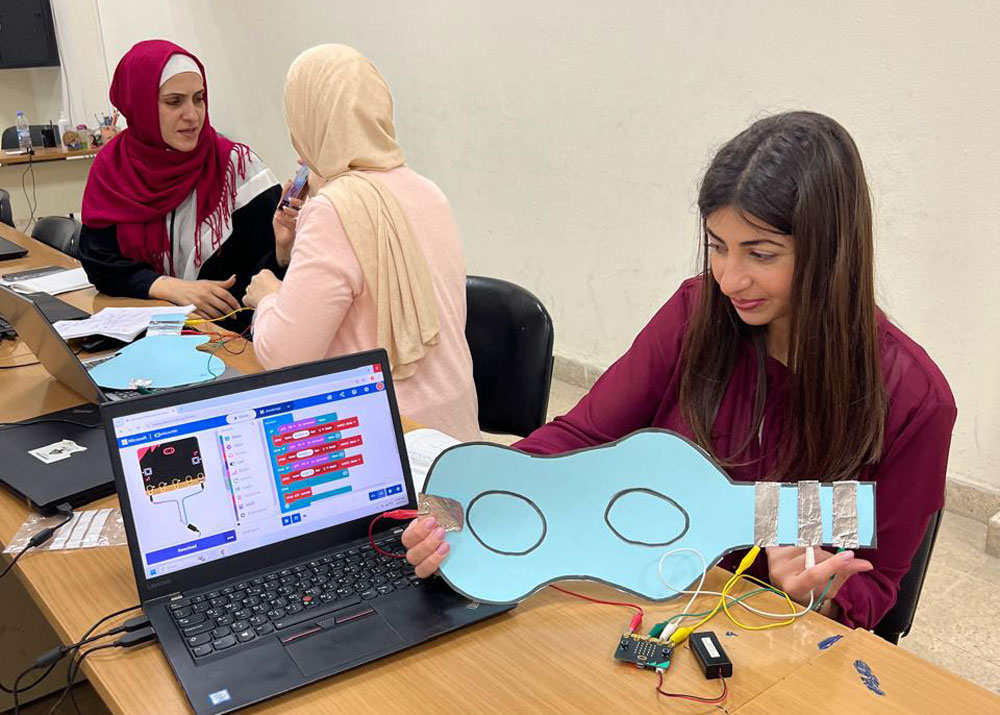
CG Fund provided the training for public and semi-private school teachers in Saida, as well as • 16 computers for Maarouf Saad Public Intermediate School • Solar power and 20 computers for Kuwaitiya Public Intermediate School • Solar and 20 computers for Public Omaniya Public Intermediate School • 5 micro:bit kits for Semi-Private Makassed al Dawha Private School • 20 computers for Ajial Saida Semi-Private Intermediate School The 2022-2023 pilot project at Maarouf Saad Middle School gave 30 hours of training plus assistance from their trainers during their first 12 classroom hours to three teachers in coding and robotics. These teachers taught 210 students during the year. These are their comments: “When I entered the class and told the students that we were going to start learning coding, one of the students jumped over the chair because he heard about coding from neighbors and he didn’t have the chance to know it.” “I am so glad that my dream came true and someone looked at public schools’ teachers and students. I was always wondering why tech skills are kept just for private school students while public school students are the ones who also need more opportunities.” The pilot was such a success that it was followed in 2024 with a training program for 13 teachers from five public and semi-private schools in Saida: Kuwaitiya, Omaniya, Ajial Saida, Makassed al Dawha and Al Kayan. They had 36 hours of training followed by 13 live class coaching for 10 of the teachers who delivered an average of 20 sessions/student to 697 students, 51% who were girls, between Grades 3 and 8. The three LITE program teachers are estimated to have reached 600+ students. Code Brave’s curriculum included • Fundamentals of programming • Using block-based and text-based programming platforms to teach elementary and middle school students • Evidence based practices in K-12 computer science education • Integration of soft skills & internet safety Comment from a parent: “When parents in this area hear that a school like ours is giving coding classes and is competing with big private schools in Saida, and this is a free school, this gave a very big push for the school and the community around it. “ Comment from a student: “What I like most about Mrs. Sarah’s [coding] classes is that I’m learning new things. I’m very excited to find the solution to each thing.”
CG Fund Supports Creative Learning in Saida through Seenaryo Playkit
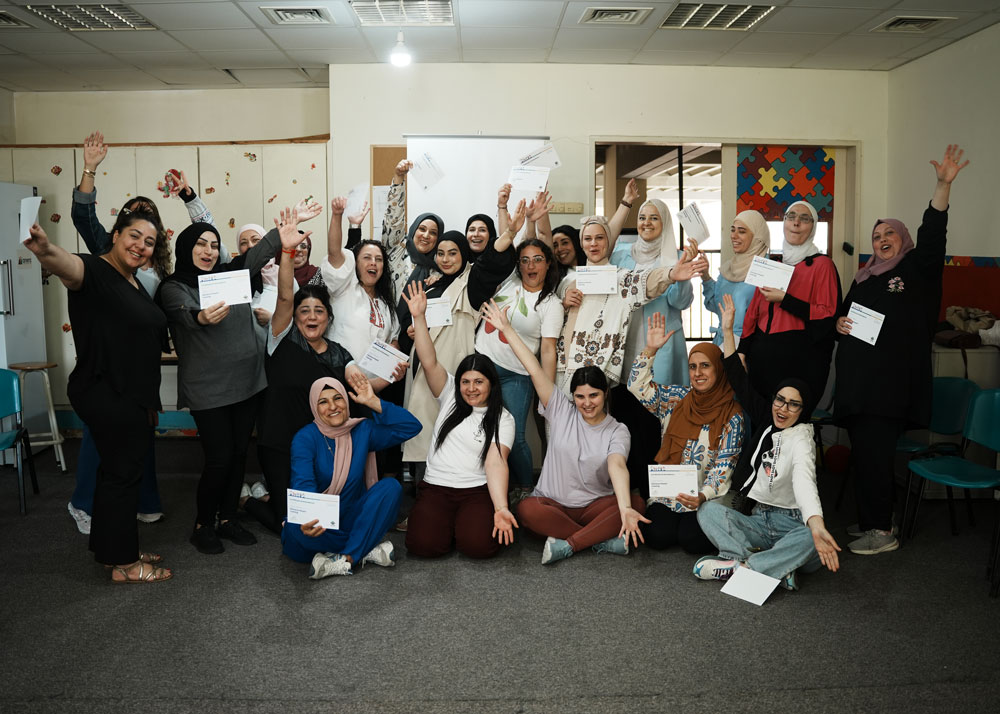
As part of our ongoing commitment to improving education in Lebanon, CG Fund is proud to support Seenaryo’s Playkit teacher training program in Saida. This initiative strengthens early childhood education by equipping teachers with innovative, creative tools for the classroom. The Seenaryo Playkit is a mobile application and training program designed for educators teaching children aged 3–8. It promotes creative learning through music, storytelling, movement, and play transforming how young children experience education. With the support of CG Fund, 20 teachers from five public schools in Saida will participate in a 4 day teacher training workshop on May 2, 3, 9, and 16. These sessions will provide practical skills and confidence to introduce play-based teaching in their classrooms. By investing in programs like Seenaryo Playkit, CG Fund continues to ensure that learning in Lebanon is not only accessible but also engaging, inclusive, and inspiring. Together, we’re creating classrooms where children thrive through creativity and play.
Empowering Youth Through Technology: 100 Computers Distributed to Beirut Schools
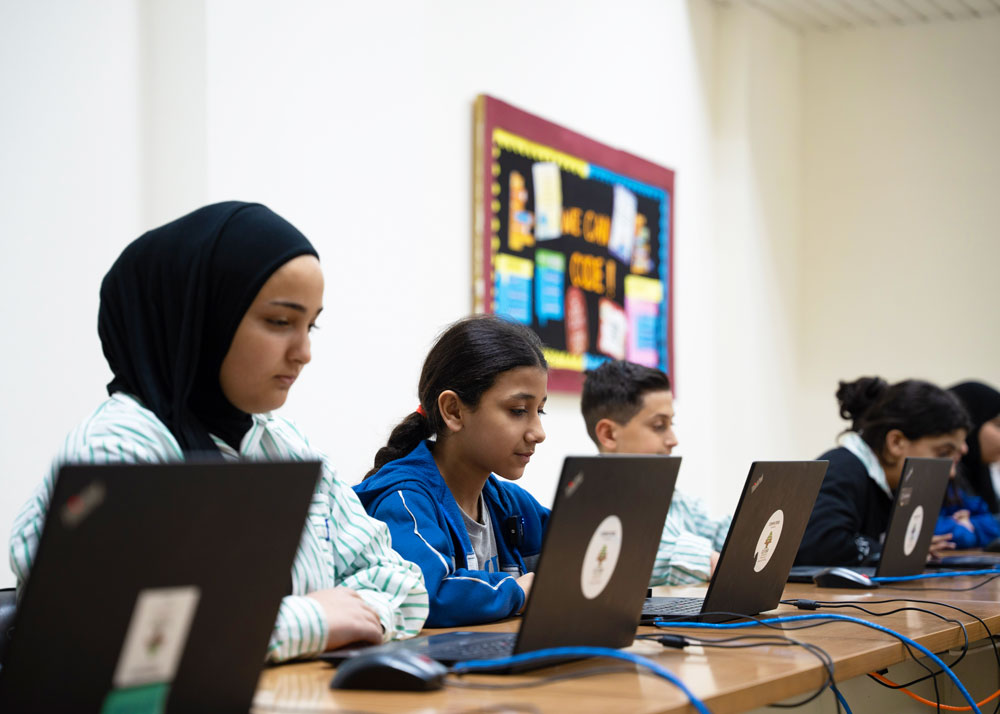
In March 2025, CG Fund took a meaningful step to enhance digital access for students by distributing 100 computers across five public schools in Beirut (20 computers per school). This initiative is part of our broader mission to promote equal access to education and digital literacy for all. Students in these schools began participating in a series of 40 sessions focused on basic computer skills. These sessions will cover essential digital tools, microsoft office, and foundational tech knowledge that today’s students need to thrive. In today’s world, education cannot wait. As technology becomes more integrated into every aspect of life, access to digital tools and skills is essential. Through this initiative, CG Fund is investing in the future of Lebanon’s youth, helping them gain the confidence and competence needed for education, employment, and innovation. This project reflects CG Fund’s continued commitment to supporting vulnerable communities in Lebanon through education, capacity-building, and innovation. We believe that by empowering students with technology today, we are helping shape a more equitable tomorrow.
CG Fund Launched Coding & Scratch Training for Teachers from Marginalized Communities

CG Fund has launched a new training program in collaboration with BMB Smart. The initiative offers 20 sessions on coding with Micro:bit and Scratch for 15 teachers working in marginalized communities. The goal is to expand digital literacy in Lebanon by helping teachers bring coding into their classrooms in a simple, practical, and engaging way. This program empowers teachers and promotes equal access to digital learning. CG Fund continues to contribute to education development in Lebanon by investing in STEM education and teacher development, offering real tools for change in marginalized groups.
CGFL Educational Giving

Dear CG Fund Lebanon Supporters, This year for Giving Tuesday, your donations will support the work CG Fund Lebanon has been doing since 2021. The need is great as the economic situation continues to affect nearly everyone living in Lebanon, and with the threat of a war, it looks even grimmer. An eight-year-old student today will be a job seeker in ten years, if she is able to complete her education. CG Fund Lebanon has been focused on the plight of the Lebanese public schools which are at great risk of failing to educate the future generations. Your help is needed to bring the next generation into the future by promoting digital transformation. To do so, these schools need: • Computers since the ones they have are too old to support coding and robotics. • Solar power since the cost of diesel for generators is both too expensive and unsustainable. • Teachers trained to teach coding and robotics. Here are ways that your contribution can help: HOW MUCH WOULD YOU LIKE TO DONATE? $5000 solar installation $500 train teachers to teach coding and robotics $300 refurbished laptops $120 one robotics kit $50 supplement one teacher’s salary Click here to donate.
Lebanon’s Education Crisis
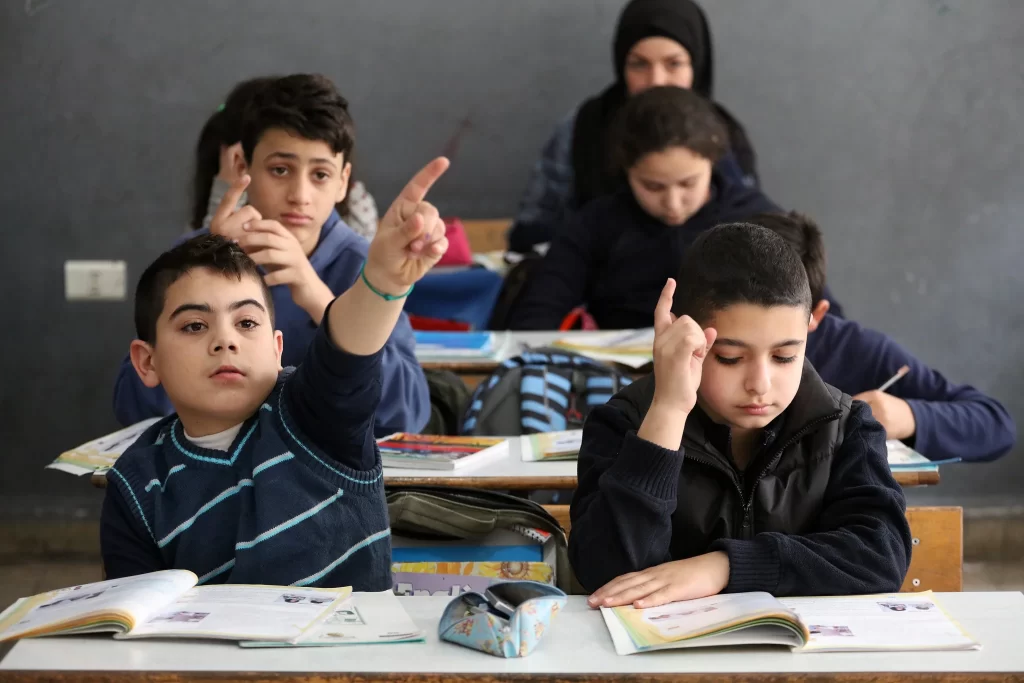
LEBANON’S EDUCATION CRISIS Monica Jubayli, CG Fund Co-Founder One of the most catastrophic economic crises globally in 150 years, exacerbated by the pandemic and the Beirut Port explosion of August 2020, has had a devastating impact on the Lebanese education sector. During the pandemic, as schools switched to online learning, many students could not participate because they either no access to a computer, electricity or the internet. The result was the same, no learning took place. 280 schools were damaged in the Beirut Port explosion making access to education difficult in the area affected by the blast. Sadly, the Lebanese reputation for being highly educated is slowly eroding as the country’s infrastructure is crumbling. The fear is real that this generation of school children will be unprepared to meet the demands of the future. So, what is happening in Lebanon to create this national tragedy? • The fall of the Lebanese Lira (LL): October 2019 $1 = 1500 LL, as of this writing, $1 = 96,500 LL. The average teacher’s salary of 2,000,000 LL (in 2019 worth $1300) is now worth about $20. • Capital control over bank deposits: You may have already seen some of the expressions of frustration Lebanese are experiencing in recent “robberies” where depositors have held up banks to withdraw their own money, no one else’s, just their own. All Lebanese, including teachers, are restricted to how much they can withdraw from their bank accounts on a monthly basis. Not able to meet their monthly expense obligations, and without access to their bank accounts, depositors have no options. For many, paying for higher education is not an option, leading to a high university dropout rate. • A brain-drain means professionals and skilled workers who can are leaving Lebanon: In 2022 nearly 25 per 1000 population emigrated from Lebanon. Experienced and highly qualified teachers have left Lebanon for jobs in the Arab Gulf region and beyond. If schools are lucky enough to fill the vacancies, they are being filled by “teachers” without teacher training or even teaching experience. • Inflation: Prices for fuel, food and other goods are surging globally, so to in Lebanon. One result is that an increase in school fees are driving private school students into public schools and public school students out of school as inflation in Lebanon hit 189.67% in February 2023. Teachers, many of whom have the same 2019 salaries, cannot afford to pay for gas to drive to work, let alone support their families. For this reason, the public school teachers have been on strike, over three months last year and another three months this year with no end in sight. • Power cuts: Government electricity only provides between 1 to 3 hours of electricity per day so residents must rely on diesel generators, or it they are lucky, solar energy to power their homes and businesses. With diesel expenses over 50% of a school’s budget, many schools have opted to not use their generators, or pay the generator membership fees, meaning the schools are literally working in the dark. The administration is unable to function, computers and vocational equipment which need electricity are no longer being used which means students are woefully undertrained. • Refugee population: Lebanon hosts the largest number of refugees in the world per capita, and new refugees are in the making as Lebanese join Syrians and others in escaping Lebanon with tragic results. Educational resources are stretched to the limit. One plus side is that many Lebanese public schools are hosting refugee community students in the afternoons, funded by UNICEF and other international NGOs, so teachers are being paid in US dollars, giving them a salary boost. Unfortunately, not all refugee or local children are able to attend school at all, resulting in thousands of children at risk of becoming child laborers or entering into early marriage. • Corruption: Corrupt power brokers, inside and outside the government are subverting the investigation into the Beirut port explosion, there has been no president for the last six months and a prime minister is in a caretaker role while politicians live off a bank generated Ponzi scheme. They have not addressed the dire needs of its citizens because they are arguing over whether or not to change to summer time. (It’s now been resolved, the clocks did spring forward, but it is seen as a distraction from the real excesses of the government and the fall of the LL.) Without a government, no educational reforms can be enacted, no national plan to remedy the years of learning loss can by tackled. The public schools, because they are dependent on the national budget, suffer more than the private schools which can cope by adjusting their tuition fees and relying on donors, alumni or otherwise. The Lebanese University system which previously acted as a great “melting pot” of students from different areas of the country, religious sects, and political backgrounds in a safe public space has suffered. As these spaces have been politicized, the governance of the Lebanese University, even including academic matters, has been influenced by partisanship. • Threat of Israeli retaliation or worse: Rockets fired from Lebanon into Israel have resulted in Israeli retaliation as they send their own rockets into Southern Lebanon, exacerbating an already difficult situation and unnerving the population along the border, all wondering if it will explode into another war. If Israel decides to invade Lebanon, one can only imagine how it would affect all aspects of the Lebanese daily life, including education, which will take a back seat to survival. In such a case, the lost generation is all but doomed to become a reality. • Mental health issues: One overlooked result of the deteriorating economic situation is the toll it is taking on the mental health of both teachers and students. The stress is enormous for teachers whose salaries do not even cover their transportation costs, let alone the worry of how to provide for their families. Students also feel the
Critical Humanitarian Assistance Impact
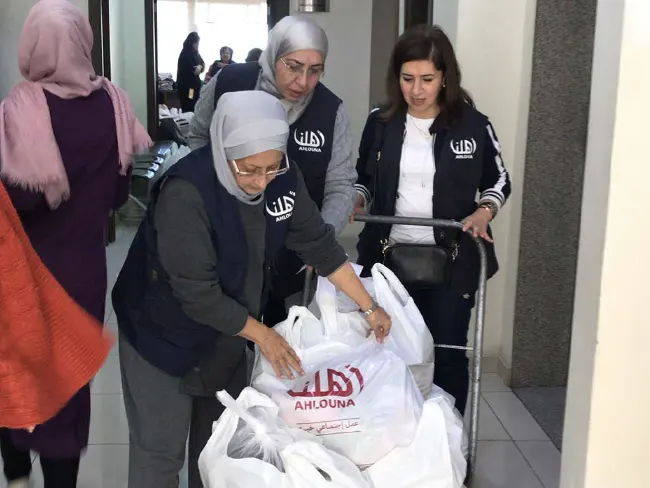
About the program CG Fund reached out to over 40 Lebanese NGOs and their beneficiaries through its Critical Humanitarian Assistance by making donations to fund: $ 1000 food distibution donated to 7 NGOs $ 10000 general donationsdonated to 20 NGOs $ 10000 supporting educationdonated to 3 NGOs $ 1000 Medical and COVID Reliefdonated to 6 NGOs $ 10000 Supplementing salaries of teachers and staff donated to 6 NGOs $ 1000 Generator maintenance & discounts on purchases of generators donated to 11 NGOs $ 1000 Jeyetna Festivaldonated to 1 NGOs $ 1000 Afghan Refugee Supportdonated to 1 NGOs
